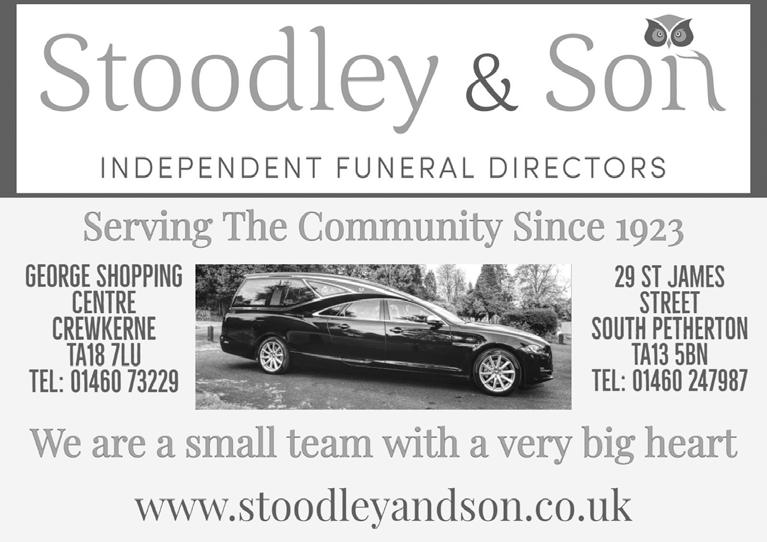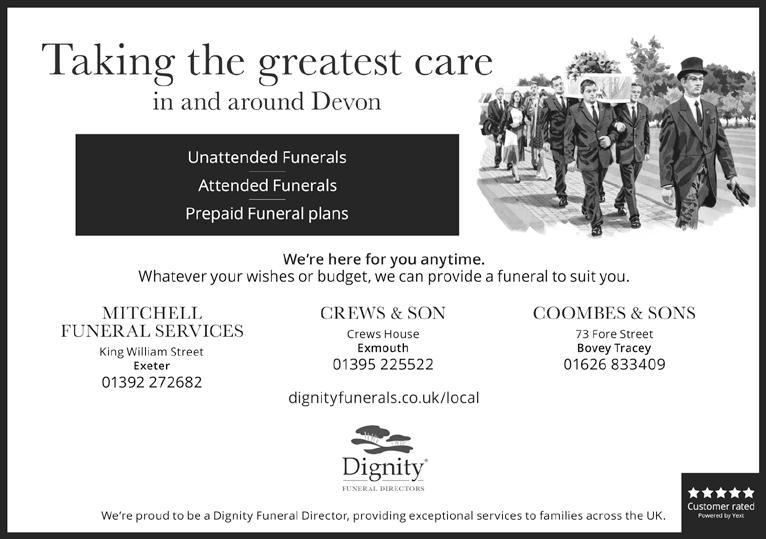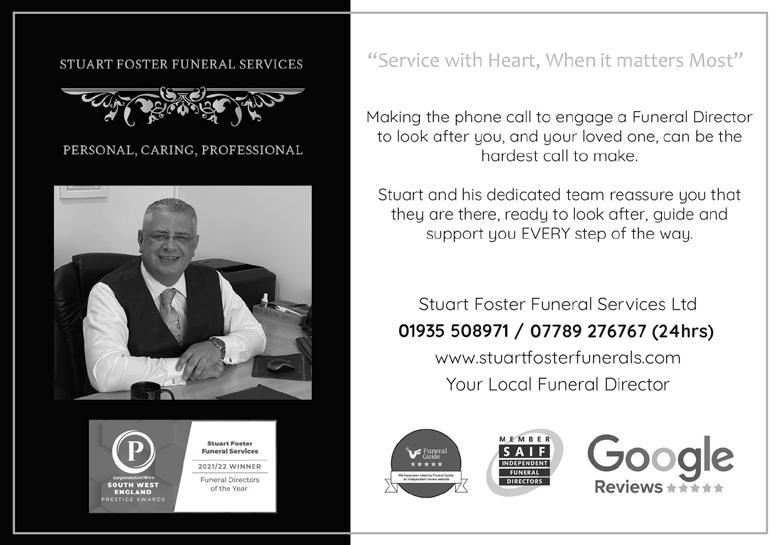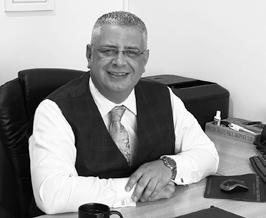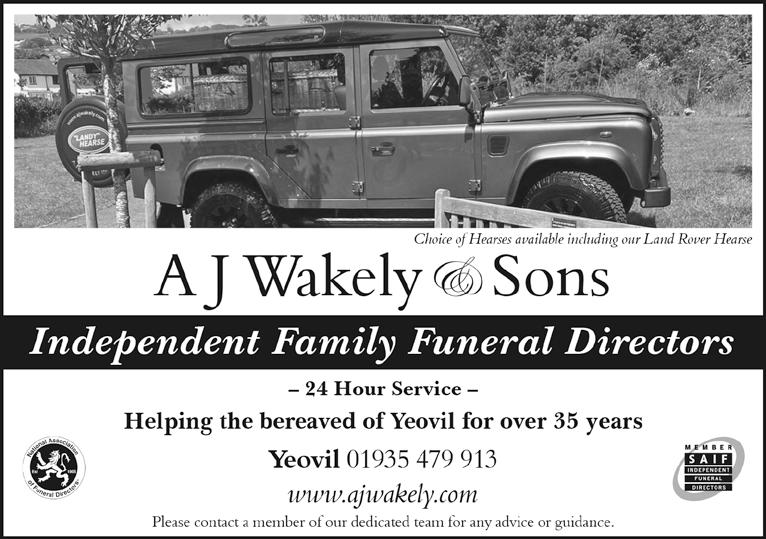Yeovil District Hospital NHS Foundation Trust would like to offer you our sincerest condolences at this difficult time. We know that the death of someone close, can be very distressing. The Bereavement & Medical Examiner Office staff are available to help and guide you through the next few days and to ensure that the practical arrangements are handled in a sensitive and timely manner.
This booklet aims to explain what happens next; including information about how to comment on the care your loved one received and what happens if a death is looked into by the Coroner.
It also provides details of the processes involved if you have any significant concerns about the care we provided and gives you practical advice, support and information.
Initial Advice
Please telephone the Bereavement & Medical Examiner Office at Yeovil District Hospital on 01935 384746 the next working day following the death or after a Bank Holiday.
We apologise if you connect to an answer phone when you call or if the line is engaged for long periods, we may be talking to another bereaved family. Please leave a message and we will return your call as soon as possible.
We advise you not to make a date for the funeral until you have spoken to us. However, you can speak to a Funeral Director to begin making arrangements for the funeral.
It is helpful for us to know if the funeral will be a cremation or a burial, as this makes a difference to the paperwork, however we do understand if this decision has not been made prior to you contacting us.
Please do not come to the hospital without prior arrangement. If you are required to attend the hospital for any reason, the Bereavement & Medical Examiner Office staff will inform you.
Introduction
This publication has been compiled using information supplied by hospitals across the country. The National Health Service is very grateful to everyone who has contributed to the development of this information. In particular, they would like to thank all the families who very kindly shared their experiences, expertise and feedback to help develop this resource.
This information has been produced in parallel with ‘Learning from Deaths - Guidance for NHS Trusts’ on working with bereaved families and carers, which can be found at :–
www.england.nhs.uk/publication/learning-from-deathsguidance-for- nhs-trusts-on-working-with-bereavedfamilies-and-carers

Medical Examiner Service and Medical Certificate of Cause of Death
Yeovil District Hospital NHS Foundation Trust now provide a Medical Examiner Service, which is a national system for reviewing deaths that occur in hospital and community. The Medical Examiner is a senior doctor working in the Trust, who is independent and not involved in the patients care. With the assistance of trained Bereavement & Medical Examiner Officers, they will review all deaths within the hospital and community in order to establish a cause of death prior to the issuing of the Medical Certificate of Cause of Death (MCCD).
During your initial contact with the Bereavement & Medical Examiner Office, you will be given the opportunity to discuss the care and treatment your loved one has received. This is a chance for you to give positive feedback, ask any questions you may have regarding any aspect of their hospital admission and express any concerns you may have. Advice will be given to you as to how such concerns can be taken forward.
The service does endeavour to provide you with the MCCD as soon as possible, however sometimes this can take a little longer due to the availability of the doctor responsible for your loved ones care and in some cases the Medical Examiner or the treating doctor may need to speak to the Coroner before we can issue the MCCD. In either case, we will inform you of any delays which may occur. There is further information on Coroners referrals on page 9.
If the MCCD is able to be issued, we will explain to you what the next steps you need to take are.
Registering the death
The death has to be registered within 5 calendar days (unless the Coroner is involved) and this should be by appointment only. You can arrange an appointment with Somerset Registrations by calling 01823 282251. The Bereavement & Medical Examiner Office staff will advise you of the best time to call.
The person registering the death must be one of the following:
• A relative of the person who has died
• A person present during their last illness
• A person present at the time of death
• A person making the funeral arrangements
The Registrar will ask for the following information about the person who has died:
• Date and place of death and their usual residential address
• Full name (and maiden/birth name if applicable)
• Date & place of birth
• If they were married, the name & date of birth of the surviving widow(er) or civil partner/the date of death of their spouse
• Occupation and the occupation of their husband/wife/civil partner
• Whether they were receiving a pension or allowance from public funds
Once you have completed the registration of death with the Registrar, they will issue a certificate of burial or cremation (Green Form) for the Funeral Director and the death certificate. They will also ask you how many copies of the death certificate you will need. These are £11 per certified copy.
You can find a list of some of the organisations who would
require a certified copy of a death certificate below. Please note, this is not a definitive list and is for guidance only.
Banks & Building Societies - those that are local which can be visited in person will require sight of the certificate. They will photocopy the original and return it to you.
• Personal Pension Companies
• Premium Bonds & National Savings
• Life Insurance
• Contracts and Agreements
• Probate
• Solicitors
• Accountants
• Stocks & Shares
• Mortgage Company & Land Registry
• Credit Cards & Finance Agreements
• Memberships of Professional or Social Bodies
The Registrar can also provide information about the Tell Us Once service. This is a free service which informs certain organisations for you to save you several different phone calls. A list of some of the organisations is below, again this is not a definitive list and for guidance only:
• DWP - you will need the deceased’s National Insurance Number
• Council Housing
• Council Tax
• Library Services
• Electoral Services
• Adult Social Services
• Blue Badge
• Housing Benefit
• Child Benefit
• Working Tax Credits
• Child Tax Credits
• Personal Taxation
• DVLA
• Driving Licence - you will need the Driver Number
• Registered Keeper of a Motor Vehicle – you will need the Registration Number
• Concessionary Travel
• Passport Agency – you will need the passport number
• Government Pensions
• NHS
• Civil Service
• Armed Forces
• Participating Local Government Offices
People you might need to inform, apart from close family and friends
Priest, vicar, minister or leader of other faiths
Hospital other than Yeovil District Hospital, dentist, optician
Bank, credit cards, Building Society
Social Services (home help or care) or other care provider
Previous place of work/ place of work (occupational pension)
Executors of the Estate named in the persons Will
Solicitor Insurance Companies, eg. car, home, life, caravan
Residential or nursing home
Landlord, housing agency
Mortgage company/landlord
Electricity, gas, telephone, water companies, internet service provider
Post Office (redirect mail)
Cancel any appointments (apart from Yeovil District Hospital and GP)
Day Centre transport
Deliveries, for example, milkman, newspapers
NHS departments for returning equipment
Employer, trade union
A child’s or young person’s teacher, employer or college if a close relative/friend has died
Tell Us Once is an optional free service that lets you report a death to most government organisations and council departments in one go.
Tissue donation
Corneas can be retrieved up to 24 hours after death and heart valves up to 48 hours (0-60 years old). If you think your loved one expressed a wish to make such a donation, please contact the Bereavement & Medical Examiner Office on 01935 384746 as soon as possible or let ward staff know if out of Office hours (9am - 5pm Monday – Friday).
Spiritual Care
Irrespective of you faith group or religion, the Hospital Chaplains can offer support to you and your family, if you would like it. The hospital chapel, located on Level 4 of the Hospital, is always open and you are welcome to use it for quiet reflection or prayer. The Chaplains can also put you in touch with officiants of other religions.
Chaplains can be contacted on 01935 386005 or chaplaincy@ydh.nhs.uk
Choosing a Funeral Director
When choosing a Funeral Director, you should feel comfortable and confident with them. Funeral Directors can manage all or part of the funeral arrangements. They can give advice on available options and provide support to help you make decisions. You can ask any Funeral Director for an estimated cost before making a commitment to use their services and it is reasonable to seek estimates from more than one company.
Many people now have pre-paid funeral plans which have all of their wishes pre-arranged. You may need to check if your loved one has one in place and which Funeral Director it was taken out with.
The Funeral Director needs to know and discuss with you:
• The name, age and religion of the person who has died
• The place of death and name of the doctor who has signed the Medical Certificate
• Any particular requests left by the person who has died
• If burial or cremation is required (please ask your Funeral Director about the costings for each of these)
• The style of coffin
• The type of service, hymns, cars, flowers, newspaper notices (if any), etc.
Funeral costs are normally recoverable from the person’s estate, however the person organising the funeral will initially be responsible for paying the bill. It is advisable to check where the money will come from before you make arrangements and when the Funeral Director will require the bill to be paid. Where finances are limited you may be entitled to help with some of the funeral costs from the Social Fund.
A list of Funeral Directors in the Somerset area is provided on pages 22-23 in this booklet.
Coroner’s Referrals
Under certain circumstances the involvement of the Coroner may be necessary. Examples of such circumstances are:
• All sudden and unexplained deaths
• Where the cause of death is unknown and a doctor cannot issue a certificate
• Any death through unnatural or suspicious causes, for example suicide, violence, poisoning, accidents
• If the death occurred as a result of a planned operation or procedure
• If the death was caused by industrial disease
The Coroner for Somerset is an independent judicial officer who enquires into those deaths who fall into the above categories. The Coroner’s Officers are independent representatives and work to the guidance of the Coroner. The Coroner’s Officers will be contacted by the doctor and the Coroner will decide one of 3 things:
• That the death was from natural causes and the doctor is permitted to issue the MCCD
• The cause of death is unknown and a post mortem examination is required
• The cause of death is unnatural and an inquest is to be held
Post Mortem Examination
The Coroner is legally empowered to request a post mortem, therefore your consent is not required. You will be informed if a post mortem is necessary by the Coroner’s Officer responsible for your loved one’s case and if you have any concerns you can discuss these with him/her.
Following the outcome of the post mortem, the Coroner’s Officer will contact you to inform you of the result. They may ask which Funeral Director you intend to use and whether burial or cremation is to be arranged.
Inquest
If the death is from unnatural causes, or there is need for further enquiry following a post mortem, the Coroner will open an inquest into the medical cause and circumstances surrounding the death. The Coroner’s Officer will explain the details to you at the time, the inquest will be adjourned and re-opened at a later date. In this situation, the Coroner will normally issue an interim Death Certificate which will enable you to register the death and make funeral arrangements. Following the inquest the Coroner will send the Coroner’s Certificate to the Registrar to allow the death to be formally registered and the full death certificate to be issued accordingly.
The Bereavement & Medical Examiner Officers will tell you if your loved one’s case needs to be referred to the Coroner and why. If we do not refer a death to the Coroner, but you have concerns relating to the treatment provided here, you can ask the Coroner to consider holding an inquest. It is a good idea to do this as soon as possible after your loved one has died; as delays in requesting an inquest may mean that any opportunity for the Coroner to order a post mortem is lost.
The local acting Senior Coroner’s Office can be contacted via:
His Majesty’s Coroner, Old Municipal Buildings, Corporation Street Taunton Somerset TA1 4AQ
Telephone: 01823 359271
Email: coroner@somerset.gov.uk
If you are seeking, or involved in, an inquest, you may wish to find further independent information, advice or support. Details of organisations that can advise on the process, including how you can obtain legal representation, are listed on pages 18-21 in this booklet.
Reviews of deaths in our care
Case note reviews are routinely carried out by NHS Trusts on a proportion of all deaths in order to learn, develop and improve healthcare, and also when a problem in care may be suspected. A case note review is where the NHS looks at the patient records and other details that are available to review a patient’s death.
These reviews are carried out by a clinician who was not directly involved in the patient’s care, looking at each aspect of their treatment and how well it was provided. When a routine review finds any issues with a patient’s care, we contact their family to discuss this further.
We also carry out case note reviews when a significant concern is raised with us relating to the care we provided to a patient. It is considered a ‘significant concern’ when:
• Any concerns raised by the family cannot be answered at the time;
• Any concerns are not answered to the family’s satisfaction or answered in a way which does not reassure them.
This may happen when a death is sudden, unexpected, untoward or accidental. If this happens, it will be discussed how these findings are shared with you, including thorough checks as to whether we have permission to share this information with family or carers.
Apart from case note reviews, there are specific processes and procedures that Trusts need to follow if your loved one had a learning disability; is a child; died in a maternity setting; or as a result of a mental health related homicide. Should they be required, we will provide you with the specific details on these processes and if they will delay the funeral.
Investigations
In a small percentage of cases, there may be concerns that the death could be, or is related to, a patient safety incident. This is any incident which could have led, or did lead, to harm for one or more patients receiving healthcare. Where there is a concern that a patient safety incident may have contributed to a patient’s death, a safety investigation will be undertaken. The purpose of a safety investigation is to find out what happened and why. This is to identify any potential learning for the Trust and to reduce the risk of a similar incident happening to other patients in the future.
If an investigation is to be held, you will be informed. We will explain the process to you and ask you about how, and when, you would like to be involved. If appropriate, we will explain how you will be included in setting the terms of reference (the topics that will be looked at) for the investigation. Investigations may be carried out internally or by external investigators, depending on the circumstances.
In some cases, an investigation may involve care providers other than Yeovil District Hospital NHS Foundation Trust. For example, if your loved one has received care from several organisations. In these circumstances, this will be explained to you, and you will be told which organisation is acting as the lead investigator.
You will be kept up-to-date on the progress of the investigation and invited to contribute. Your comments will be incorporated into the report. After the report has been signed off, the Trust will make arrangements to meet with you to discuss the findings. You may find it helpful to get independent advice about taking part in investigations and other options open to you. Some people will benefit from having an independent advocate to accompany them to meetings and you are
welcome to bring a friend, relative or advocate to any meetings you attend. Details of independent organisations that may be able to help are on pages 19-20 of this booklet.
Where the death of a patient is associated with an incident during a patient’s care, staff must follow the Duty of Candour Regulation which means we have to be honest and open. The Clinical Governance Team will explain the process to you in more detail and the lead investigator will contact you.
Providing feedback, raising concerns or making a complaint
Providing feedback: We value and welcome your thoughts about your loved one’s care. Receiving feedback from families helps us to understand:
• The things we are doing right and need to continue; and
• The things we need to improve upon.
Raising concerns or complaints: It is very important to us that you feel able to ask questions and raise concerns regarding the care your loved one received. You can do this by informing the staff in the Bereavement & Medical Examiner Office, as they may be able to answer your concerns by reviewing the notes. If there are any serious care concerns, we will highlight these to our Learning from Deaths Lead within the Trust who will look into these further.
If you would prefer to discuss your concerns with someone not directly involved in your loved one’s care, please contact our Patient Advice and Liaison Service (PALS) on:
Telephone: 01935 384706 or email: pals@ydh.nhs.uk

